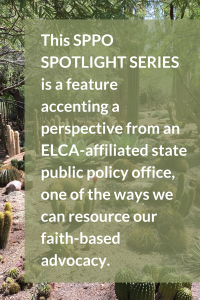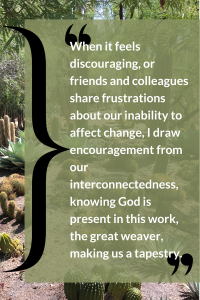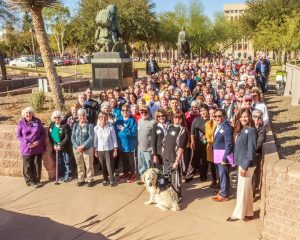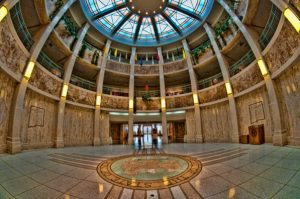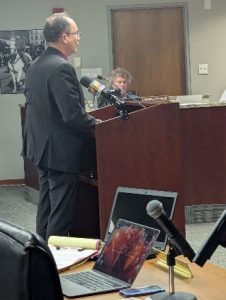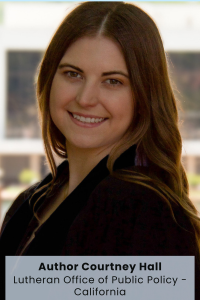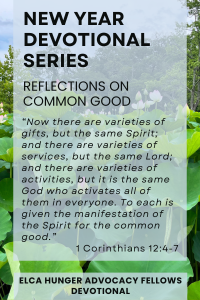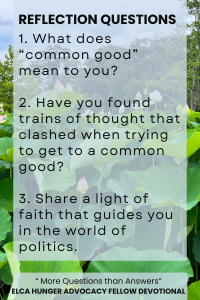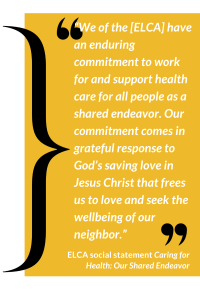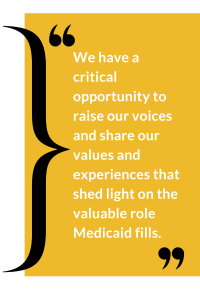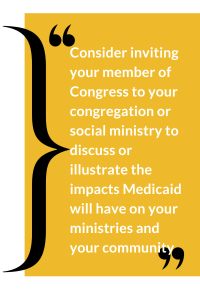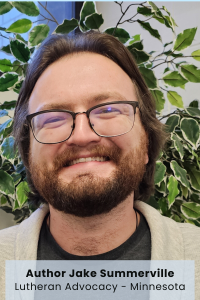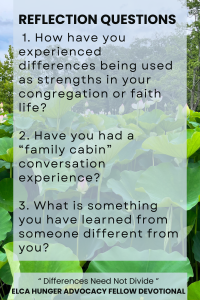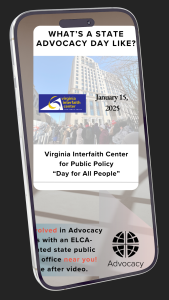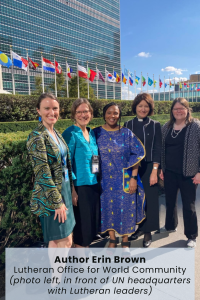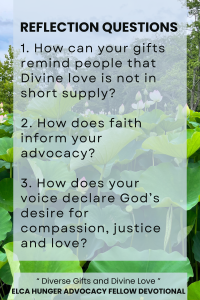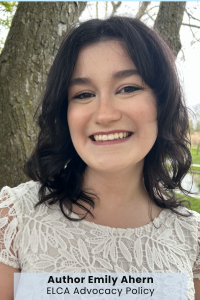from the ELCA advocacy office in Washington, D.C. – the Rev. Amy E. Reumann, Senior Director
Partial expanded content from Advocacy Connections: March 2025
FEDERAL STAFF WORK REDUCTIONS | BUDGET RESOLUTION CUTS IN ENERGY PROGRAMS | U.S. FOREIGN ASSISTANCE FREEZE | AUGUSTA VICTORIA HOSPITAL | IMMIGRATION ENFORCEMENT ROADMAP
 FEDERAL STAFF WORK REDUCTIONS: The Trump administration is implementing widespread workforce reductions across federal agencies through the Department of Government Efficiency (DOGE) led by Elon Musk. Not only are many in ELCA congregations who have been employed in public service positions reeling from changes, these cuts directly impact vulnerable populations served by federal agencies. The process has been chaotic, with some terminations quickly reversed at agencies like the Indian Health Service and Department of Agriculture. Experts describe the approach as using a “sledgehammer” rather than a “scalpel” to downsize the government.
FEDERAL STAFF WORK REDUCTIONS: The Trump administration is implementing widespread workforce reductions across federal agencies through the Department of Government Efficiency (DOGE) led by Elon Musk. Not only are many in ELCA congregations who have been employed in public service positions reeling from changes, these cuts directly impact vulnerable populations served by federal agencies. The process has been chaotic, with some terminations quickly reversed at agencies like the Indian Health Service and Department of Agriculture. Experts describe the approach as using a “sledgehammer” rather than a “scalpel” to downsize the government.
Why It Matters in the ELCA:
Lutherans recognize public service as a worthy calling and that public servants are to be treated with respect and dignity. People directly impacted by such changes in federal agencies include people experiencing homelessness, those dependent on affordable housing programs, farmers, Native American communities and most groups identified as priorities in social ministry work. These reductions, paired with continued backlogs of frozen grants and federal aid, threaten essential services that align with the church’s efforts to support our neighbors. Ongoing disruptions in federal services continue to cause crises, particularly in rural communities.
What’s Next:
The administration’s workforce reduction efforts will likely continue, but with ongoing reversals where compromise of critical functions is recognized or litigated. Housing and homelessness programs face particular uncertainty with proposed 84% staff reductions in HUD’S Office for Community Planning and Development. Witness in Society staff are connecting with Republican leadership in Congress to push back against the measures, and wider efforts to restructure critical funding streams.
 BUDGET RESOLUTION CUTS IN ENERGY PROGRAMS: In attempts to advance the priorities of the new administration, Congress is working on a budget reconciliation package that will include cuts to programs that will significantly impact health care, hunger and other aspects of our communities, including energy programs. The Senate Budget Committee passed a budget resolution that would provide additional funds for defense spending, border security and immigration enforcement, and it would likely repeal many of the energy-related tax credits and other provisions enacted in last year’s Inflation Reduction Act (IRA). House Republicans are aiming to move one massive reconciliation bill that, in addition to the policies included in the slimmer Senate resolution, would extend the corporate and individual tax cuts in the Tax Cuts and Jobs Act of 2017 (TCJA) and would likely propose significant cuts to safety net programs, including Medicaid, the Supplemental Nutrition Assistance Program (SNAP, also known as “food stamps”) and the Children’s Health Insurance Program (CHIP).
BUDGET RESOLUTION CUTS IN ENERGY PROGRAMS: In attempts to advance the priorities of the new administration, Congress is working on a budget reconciliation package that will include cuts to programs that will significantly impact health care, hunger and other aspects of our communities, including energy programs. The Senate Budget Committee passed a budget resolution that would provide additional funds for defense spending, border security and immigration enforcement, and it would likely repeal many of the energy-related tax credits and other provisions enacted in last year’s Inflation Reduction Act (IRA). House Republicans are aiming to move one massive reconciliation bill that, in addition to the policies included in the slimmer Senate resolution, would extend the corporate and individual tax cuts in the Tax Cuts and Jobs Act of 2017 (TCJA) and would likely propose significant cuts to safety net programs, including Medicaid, the Supplemental Nutrition Assistance Program (SNAP, also known as “food stamps”) and the Children’s Health Insurance Program (CHIP).
Why It Matters in the ELCA:
Passage of the IRA led to the largest investment the United States had ever made to address climate change and care for God’s creation. Included in the IRA were clean energy tax credits that individuals or churches could use to help the transition to clean energy (solar panels) or more efficient appliances. Various ELCA churches have made investments in these building upgrades while accounting for a 30% financial contribution from the federal government. With the potential for these tax credits to be cut, some congregations could be in the precarious situation of bearing the unexpected burden of climate-friendly technology expenses that were supposed to be covered by tax incentives.
What’s Next:
Congressional leadership will be working to advance some form of reconciliation package since passage in the House of the budget resolution blueprint. With both the House and Senate resolutions passed, committees in each chamber are conferencing legislative language to fulfill the instructions set out in the budget resolution. ELCA advocacy staff will be working with interfaith partners and coalitions to track the measure as it advances.
 U.S. FOREIGN ASSISTANCE FREEZE: The Trump administration’s pause of U.S. foreign assistance and stop-work orders largely remains in place. Although some Non-Governmental Organizations (NGOs) that implement U.S. foreign assistance programs have received waivers for specific “lifesaving” projects, many of them have not been able to restart these programs for various reasons. Reasons include the fact that their contracting officers at the U.S. Agency for International Development (USAID) have been fired in addition to inaccessibility of the payment system used to process funds to these organizations. Moreover, the majority of humanitarian and development programs do not qualify for a waiver because they don’t fit the narrow definition of a “lifesaving” program per the guidance from administration officials at Department of State. As of Feb. 28, 90% of foreign assistance programs have been terminated, including those that received a waiver to proceed with work.
U.S. FOREIGN ASSISTANCE FREEZE: The Trump administration’s pause of U.S. foreign assistance and stop-work orders largely remains in place. Although some Non-Governmental Organizations (NGOs) that implement U.S. foreign assistance programs have received waivers for specific “lifesaving” projects, many of them have not been able to restart these programs for various reasons. Reasons include the fact that their contracting officers at the U.S. Agency for International Development (USAID) have been fired in addition to inaccessibility of the payment system used to process funds to these organizations. Moreover, the majority of humanitarian and development programs do not qualify for a waiver because they don’t fit the narrow definition of a “lifesaving” program per the guidance from administration officials at Department of State. As of Feb. 28, 90% of foreign assistance programs have been terminated, including those that received a waiver to proceed with work.
Why It Matters in the ELCA:
The U.S. foreign assistance 90-day freeze has already caused significant harm to people all around the world, including displaced populations living in camps and folks who depend on U.S.-financed medicines to treat conditions such as HIV. As stated in the ELCA social statement Sufficient, Sustainable Livelihood for All, “The world is the whole household of God that economic life is intended to serve. The Spirit of God expands our vision and transforms our priorities,” and we recognize the critical importance of U.S. foreign aid to communities most in need around the world.
What’s Next:
ELCA Witness in Society staff continue to meet with congressional offices to share concerns about the negative consequences this funding freeze is causing around the world, including its impact on the work of our church partners. Recently a federal judge at the U.S. District Court for the District of Columbia ruled that the Trump administration could not freeze foreign aid funds that predate his inauguration and instructed Trump administration officials to release frozen funds by midnight, Feb. 26. This was followed by the Supreme Court‘s pause of the lower court order while it considers the Trump administration request to block the lower court’s ruling.
 AUGUSTA VICTORIA HOSPITAL: The U.S. government foreign funding freeze continues to keep monies already appropriated for the Augusta Victoria Hospital (AVH) in limbo. Additionally, all funding from the U.S. government for Palestine has been suspended, and it is unclear if any new funding assistance for AVH or Palestinian initiatives writ large will be approved by the current administration. Without a solution to this financial issue, AVH will eventually have to reduce the number of cancer patients they can treat this year.
AUGUSTA VICTORIA HOSPITAL: The U.S. government foreign funding freeze continues to keep monies already appropriated for the Augusta Victoria Hospital (AVH) in limbo. Additionally, all funding from the U.S. government for Palestine has been suspended, and it is unclear if any new funding assistance for AVH or Palestinian initiatives writ large will be approved by the current administration. Without a solution to this financial issue, AVH will eventually have to reduce the number of cancer patients they can treat this year.
Why It Matters in the ELCA:
AVH, which is run by Lutheran World Federation, has wide support in the ELCA including engagement in advocacy on the hospital’s behalf. Support between ELCA membership and AVH is also evident with many ELCA members aware of the hospital’s work and positive impact on the lives of Palestinians.
What’s Next:
ELCA Witness in Society staff conducted a week of advocacy (Feb. 24-28) on Capitol Hill with a delegation from the LWF that included the CEO of AVH and LWF’s representative to Jerusalem. The advocacy week resulted in meeting with almost 20 congressional offices, including direct engagement with U.S. Sen. Chris Van Hollen and with staff of House Speaker Mike Johnson’s office. Building on the work that was done, ELCA advocacy staff will continue to engage with Congress to find a way to unfreeze funding to AVH and work to request additional funding be provided to AVH on a bipartisan basis, as has been done for the past 15 years.
 IMMIGRATION ENFORCEMENT ROADMAP: In late February, the House of Representatives and Senate passed budget blueprints to allow trillions in tax cuts and massively increase immigration enforcement spending as proposed by President Trump. The House’s budget resolution proposes more than $300 billion in military and immigration enforcement spending; the Senate’s has $340 billion. The budget resolution lays a roadmap for increases to border wall construction, detention and deportation across the nation. To meet deficit targets, Congress may propose tax-and-spending policy changes such as additional restrictions for safety net programs for which certain immigrants, including children, pregnant people and green card holders aged 5 and older, are eligible.
IMMIGRATION ENFORCEMENT ROADMAP: In late February, the House of Representatives and Senate passed budget blueprints to allow trillions in tax cuts and massively increase immigration enforcement spending as proposed by President Trump. The House’s budget resolution proposes more than $300 billion in military and immigration enforcement spending; the Senate’s has $340 billion. The budget resolution lays a roadmap for increases to border wall construction, detention and deportation across the nation. To meet deficit targets, Congress may propose tax-and-spending policy changes such as additional restrictions for safety net programs for which certain immigrants, including children, pregnant people and green card holders aged 5 and older, are eligible.
Why It Matters in the ELCA:
Deliberately removing access to social safety net programs which certain eligible immigrants may make use of in emergencies will leave these persons more vulnerable to food, housing and medical insecurity. Lutherans have consistently advocated for immigration reforms to ensure a balance is met across security concerns and human dignity. The ELCA Economic Life social message affirms the role of government in helping meet the human needs of eligible immigrants.
What’s Next:
Various pieces of legislation have been floated as options during federal budget reconciliation, like the Secure the Border Act (H.R.2). Lawmakers will consider a slate of options in each committee of jurisdiction. Congress passed and President Donald Trump signed into law a year-long stopgap funding bill, known as a continuing resolution (CR), to extend funding for the federal government through September, but budget negotiations continue.
Receive monthly Advocacy Connections directly by becoming part of the ELCA Advocacy network – http://elca.org/advocacy/signup , and learn more from elca.org/advocacy .

